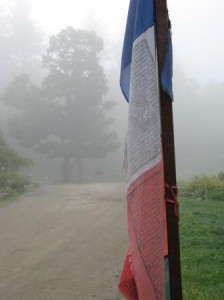Saturday
Community ArticlesThe Stupid Might of Materialism
 By Lois Lungta, on the eve of the opening of the movie Avatar.
By Lois Lungta, on the eve of the opening of the movie Avatar.
I sometimes dream of what it is like to live in a dead world. A world populated by ghosts living out their lives in human form. Where objects are solid and devoid of means of communicating their presence, being beautiful only in the amount of money they cost to purchase. Where selling earth, fire, water, and air are the means by which we can fill our pockets.
It is a dream from which we easily awake, with sweat on our brows, limbs tingling from the tension of the nightmare, and an overwhelming sense of relief to find once again the sun on our face and the wind flowing in and out of our lungs.
Sometimes, when I awake, I feel the weight of sadness and loneliness. The raw power of this dream world shakes me to the bones, I feel an imminent sense of threat, and occasionally I want to crumble under it and die.
So I die. The moment of utter hopelessness holds me in a breathless cocoon, where I lose my effort to control, resurrect, and fix. Curled into a womb of emptiness, I give in until the moment passes. Until I open my eyes and see that the next moment is already occurring, that there are things passing before my senses and that while something certainly passed away, I am once again awake and somehow, I’m still breathing.
Now, don’t start to worry about me. This is simply my experience of living in a dark age. And the vividness of navigating it was called to mind by seeing the movie Avatar.
But I am not inspired to write about a stunning display of special effects, a fantastically beautiful world populated by an indigenous race with a sublime sense of connection to all living things. I am not even going to pontificate on the profound message offered by the movie ~ which in many ways is a familiar resurrection of the Noble Savage theme that has run through literature and movies for longer than I’ve been alive.
What Avatar pointed out for me was the sheer power of our aggression. When the military unleashed its rain of firepower, machinery, and bravado upon the tribe and their sacred land, the familiarity of this mindset shook me to the bones. The scenes in which the general roused his troops to battle could have been lifted from any movie about war-heroes, during which we feel a powerful sense of mission, duty, and sacrifice in the soon-to-be killing machines. Usually, we feel the urge to cheer them on because they are the protectors of freedom and humanity.
In Avatar, I got a visceral sense of the militaristic approach run amok. In which their might was used unabashedly for material gain. Perhaps this was a fault of the movie, because what soldier would die for such a thing? No one, if it were that straightforward.
The trick to materialism is that it disguises itself as something we can believe in wholeheartedly. We are not buying things, we are buying pleasure. We are not taking over resources for our own use, we are taming the land. We are not destroying the civilization that protects these things, we are bringing them the freedoms of our ways.
No one wants to admit their real motivation. And that is why we are so hooked.
 There is one moment in the movie where Jake –- the hero — is asked by a killing machine military general, “How does it feel to betray your own race?” I felt the sting of that question, the dig of duty and allegiance to the setting sun values we were given, that surround us daily with its messages. And I thought to myself, “That general is Mara questioning the Buddha under the Bodhi Tree.”
There is one moment in the movie where Jake –- the hero — is asked by a killing machine military general, “How does it feel to betray your own race?” I felt the sting of that question, the dig of duty and allegiance to the setting sun values we were given, that surround us daily with its messages. And I thought to myself, “That general is Mara questioning the Buddha under the Bodhi Tree.”
Ignore for a moment the fact that Jake was a human on a distant planet, fighting to protect the ways of indigenous people who were alien to him. Stay with the gradual training he underwent to align himself with the energy of the planet, and a people who had long formed ways of living in harmony with it.
“How does it feel to betray your own race?” How does it feel to switch allegiance from at-all-cost aggression? From the speed that keeps us from truly contemplating the effects of our actions? The activity that all blurs together so that hardly any of it accumulates the power necessary to effect real benefit?
The general’s question was a last ditch effort to dispirit Jake, to distract him during the final throes of one-on-one combat. But the effect of it invoked the opposite feeling in the audience. Spread before us was this choice that Jake had made, valuing connection and relationship, profundity and sacredness, respect and the humility of wonder.
Maybe the moment had such an impact because Jake’s choice had transcended race, transcended humanity, and even the Earth. It was an embrace of life.
When Mara questioned the Buddha, saying “Who are you to think you can attain enlightenment?” the Buddha’s response was simple. He touched the Earth and said, “The Earth is my witness.”
The Earth witnesses us, as we are. And look what we have done. Look at who we have become.
 One of the major gifts of this movie is watching the mechanistic power battle the living power. Many, many times in my life I have felt overrun by mechanisms of our culture that do not pause, consider, listen, or bend to meet me as I am, a human being navigating a complex array of circumstances and dynamics. There is no room for the complexity of existence, the widespread effects of the rules they are enforcing are completely ignored.
One of the major gifts of this movie is watching the mechanistic power battle the living power. Many, many times in my life I have felt overrun by mechanisms of our culture that do not pause, consider, listen, or bend to meet me as I am, a human being navigating a complex array of circumstances and dynamics. There is no room for the complexity of existence, the widespread effects of the rules they are enforcing are completely ignored.
As I watched sacred trees crumble and characters die in various ways, I felt surrounded by a theme as familiar as my skin. The battle being waged on the screen was not only one being fought in war zones, in halls of diplomacy, and in corporate cubicles. It happens moment by moment as we reach towards sacredness, long for connection, and contemplate meaning. The obstacles thrown in the path of our understanding, our accumulation of merit and wisdom, are powered by a might so freaking stupid that it is immensely powerful and frightening. The veils surrounding its attacks are so thick that we can’t even see things coming, and when we can the motivation behind the attack is so pointless and inconsiderate that we can’t even believe it. We go into shock, are paralyzed, and once again, materialism wins.
But we can touch the Earth. In Avatar, the living power of their planet is all the tribe has to turn to, in the end. They can be warriors, they can amass and fight and act heroically. But it all comes down to the power of life itself.
We are trained to realize our connection with all beings, in fact, we vow to benefit them all. This motivation is not only fuel for our path and for working with the world – it is in itself a revelation of the inseparability of life. We can have faith in that.
We can touch the Earth.





Jan 20, 2010
Reply
We are all interdependent and share a tiny jewel of life called Earth. It makes no sense to poison our own world or for anyone to gain from the suffering of another. The entire system is greater than the sum of it parts and the health of the whole depends on the freedom and health of the parts and the parts depend on the health of the whole.
Dec 25, 2009
Reply
Dear Contrarian,
If only we knew your identity, we could invite you to share more!
Your view, in which “humanity is in touch with their mindfulness and discernment” is surely born of your confidence. And yet, touching the pain of our mistakes is also part of the process of learning to act with mindfulness and discernment, on a moment by moment basis. How can we know the ways of facing and taming without having touched the pain of mistaken view ourselves? Since we hold such power, we are in fact in a delicate and potentially dangerous situation. As the Sakyong teaches, just as we work with this creative power, we must also know what to refrain from. And history points out the acts that perpetuate suffering and those which rouse benefit.
Regret and grieving is in fact an act of creativity, if we learn and continue taking forward steps. Yes, let’s raise lungta and act responsibly — not for dominion or accumulation — but because we care.
Dec 24, 2009
Reply
Last time I checked, the Earth wasn’t a sentient being. If I crack open a rock, it doesn’t scream and there aren’t any karmic consequences. I grok the need to take care of the environment we live in just as I grok the need to clean my house so that I don’t live in filth. But maintaining the pristine nature of the planet is like not putting any furniture into a house I just bought, or an apartment I just rented. I believe human beings can find a balance to use and exploit the resources of our planet without destroying it. I also believe human beings are the pinnacle of biological evolution on this planet — not trees, not fish, not birds…humans. Frankly I think the environmentalist movement is a well co-ordinated campaign of media histrionics for repressive political ends.
Rather than writing articles reinforcing our propensity to feel guilty about our abilities, we as the Shambhala community should instead promote a positive view of humanity — a view in which humanity is in touch with their mindfulness and discernment. If one is mindful and in touch with practice, one is more aware of the pitfalls of consumerism and mass media without feeling like humans are a virus that it would be better to exterminate. And if we as a race decide that we would rather sh!t where we eat, then we shall reap what we sow. So what. Impermanence is a bitch. I frankly don’t think an insentient rock hurtling through space gives a damn about what we do to it. But we hold the entire potential of the creative power of the universe in our hands (and minds) and for that none of us should be sorry. We should instead raise lungta and act with responsibility, a responsibility that comes from within and not from coercive legislation ordained by government or spiritual edict.
Don’t look at the ground, look at the sun!